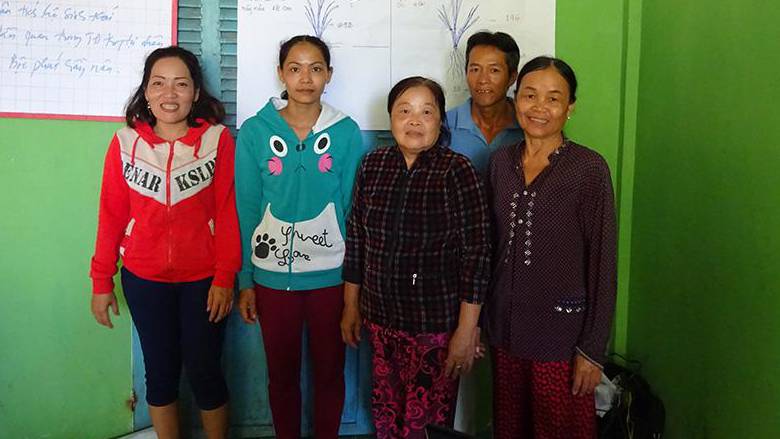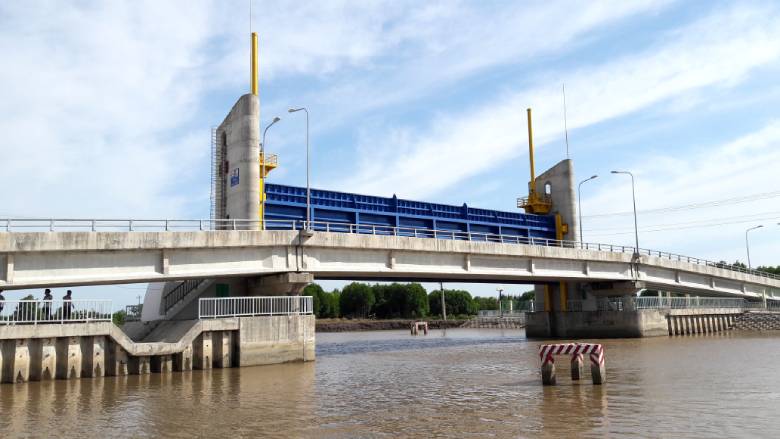Results
From 2011 to 2017, the project invested in water management infrastructure – river and sea dykes, sluices, and dredging of secondary and tertiary canal systems – to protect and enhance the utilization of water resources in project provinces of the Mekong Delta to sustain gains in agricultural productivity. Thanks to the project, providing people, including the poor, with household-level access to sustainable, safe and potable drinking water supply through piped water-supply schemes and improved sanitation contributes to the improvement of their health and livelihoods. A combination of measures including awareness raising, water resources management planning, etc. were designed to create the needed water management infrastructure and to increase the institutional capacities at all levels to cope with increasing saline intrusion, variable flow regimes and growing competition for water resources.
More specifically, it contributed the following results:
Approximately 215,000 farming households benefited from improved irrigation services. The project provided an area of 134,162 hectares with new (54,033 ha) or improved (80,129 ha) irrigation or drainage services.
Prevention of salinity intrusion and flood risk management allowed agricultural production on 104,864 hectares of land.
Agricultural yields are expected to increase by an average of 10-15 percent. Estimates also suggested an increase in the income of farmers.
The project’s impact on increased agricultural productivity led to decreased competition for water resources and supported the sustenance of agricultural production in areas facing water scarcity.
Water productivity increased by 35% with the adoption of new technologies.
66,165 rural households benefited from supply of potable water.
10,055 latrines were constructed, and this was supported by behavioral change and awareness campaigns combined with the establishment of 30 one-stop sanitation shops which sell latrines and other sanitation-related products.
The project empowered women by promoting their participation in the Integrated Pest Management training to grant greater access to women in the agricultural sector. Additionally, the project partnered with the Women’s Union to involve women in the project sanitation campaign.
Bank Group Contribution
Along with a $143.6 million credit from the International Development Association (IDA), the World Bank brought global knowledge and international best practices on water resource management in Delta regions, including successfully strengthening the capacity of local implementing partners and their staff. The Bank’s engagement helped to take into account socio-economic conditions towards managing water while taking into account the impacts of climate change.
Partners
The project invested efforts and resources to strengthen the capacity of 37 local implementing partners and their staff to improve project execution. The project collaborated with Can Tho University to identify new agricultural technologies that were piloted during project preparation. Additionally, the project partnered with the Ministry of Agriculture for support with structural investments and the Ministry of Health to aid with sanitation initiatives. The Project also closely collaborated with the Netherlands through the Embassy in Hanoi to promote the concept of soil-bank in managing soil materials gained resulting from dredging works.
Moving Forward
Learning from the project, future projects would recognize the institutional complexities in Vietnam along with the need to decentralize and allocate adequate resources for formal and on-the-job capacity building. The project contributed to an overarching water narrative for delta areas by reflecting a vision which tried to integrate ‘water for agriculture’ and ‘water for people’ and introduced ‘climate change adaptation’ as a cross-cutting element. The project also helped to highlight water governance issues to inform the development of water strategies, provide an integrated view of challenges, and identify priority activities to achieve national water security.

Female farmers attend the Integrated Pest Management training in Hau Giang province. Photo: ASEAN
Beneficiaries
The project benefited farmers, households in the upper delta provinces, and aquaculture farmers along the coastal provinces. Residents in the delta saved time collecting water for their households and money for buying treated water. Working days lost due to water-borne diseases were reduced. The project specifically targeted poor communities that did not have access to potable water and sanitation. Furthermore, the project also targeted women so that they benefited from agricultural gains and improved their access to water and sanitation.

